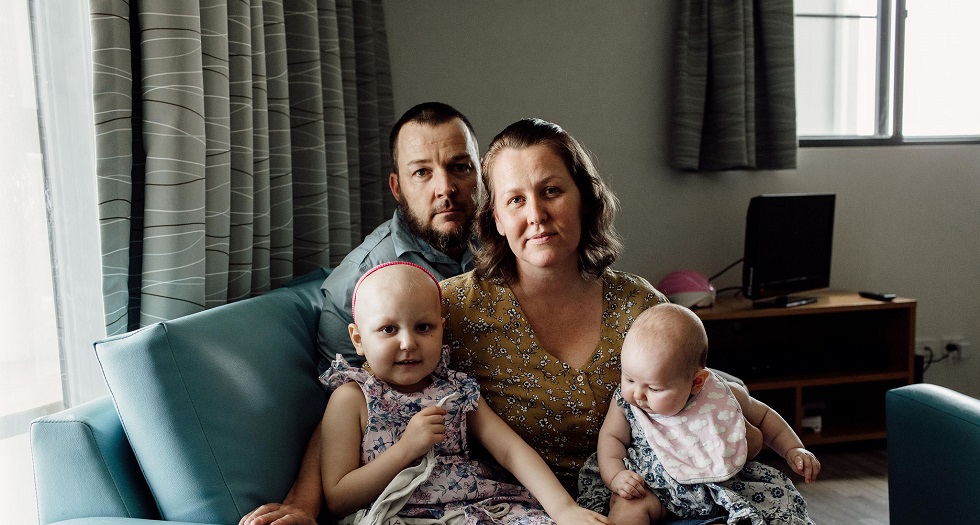Blood cancer doesn’t stop: Ari’s story

Ari Baczynski, aged 4, was diagnosed with blood cancer last year. She must still travel across Queensland to hospital each month for life-saving treatment, but now her family must face the added challenges brought about by COVID-19.
Ari’s mum, Bonnie, spoke to us about the ways the family is protecting itself and the impact the virus is having on their lives.
Our biggest concern is if there will be a bed for Ari should the hospitals become too full
Self-isolation and social distancing
Last week the hospital sent an information sheet to oncology patients, including us, and their recommendation is to avoid sending young people who are being treated for cancer to school, kindy or daycare, and to avoid taking them to shopping centres. Basically, they recommended we self-isolate as much as possible and they’re trying to limit traffic through hospitals as well.
My husband, Elliot, still needs to work running our small business and my six-year-old son, Oren, is still attending his tiny primary school of only 21 kids.
Elliot is taking extra precautions and works from home as much as he can. I feel confident the school is taking all measures possible to keep the kids safe as there are already a few high-risk children at the school.
Essential services
We’re currently trying to apply for online grocery orders; the supermarket will now only do them for senior citizens and immune-compromised people. We’re still waiting for our application to be approved and to provide proof of Ari’s special case. Luckily, we get our fruit and vegetables delivered by a local business, so we are ok for a while.
We’ve also put a sign up at the front gate for any deliveries to be left on the veranda in boxes.
The problem is a lot of people are now travelling out to the regional areas to get supplies, so our local stores are also running out of essential items.
Practicing good hygiene
Because of Ari’s treatment last year we’re all pretty used to having to isolate ourselves and constantly making sure we’re washing our hands. Ari has her own sink and the whole family has the nail brushes handy for a proper scrub.
Access to treatment
Once a month Ari is still travelling to the city for treatment. Because of COVID-19, the children’s hospital is only letting one parent come for out-patient appointments, so my husband has been going with her while I stay and look after our other children.
Preparing for an emergency
We have a local ambulance and hospital protocol should Ari catch a fever, and a direct line to our regional case manager and to the oncology department at the hospital should we need to speak to anyone.
The oncologist has said to us that if Ari caught the virus it wouldn’t be too bad. She had Rous sarcoma virus (RSV) when she was first diagnosed and her immune levels were much lower then. It shouldn’t be too different to that.
Our biggest concern is, if the hospitals become too full, there will not be a bed for Ari should she become ill. If she needs care, what does that look like? The extra demand on the hospital system seems to be the biggest concern of the government as well. It’s the people with the existing conditions, like Ari, that will find it hard.
Words to live by
Everybody needs to come to terms with the fact that we are in for the long haul. I realise this is a big shock for people. I guess those living with blood cancer know what it’s like to be told you must adjust to a new way of life. I think people need to get used to the fact that we are all going to need to make sacrifices for the greater good.
#yourstorycounts
Share your story of living with blood cancer in the COVID-19 crisis.
Tell us how the outbreak has impacted your every-day life and how the Australian community can best support you through this uncertain time.
Also share your message of support for other blood cancer families and advice for keeping safe during the outbreak.
We may then share on this page for our blood cancer community.
Email storyhub@www.leukaemia.org.au with your story.
Last updated on May 24th, 2024
Developed by the Leukaemia Foundation in consultation with people living with a blood cancer, Leukaemia Foundation support staff, haematology nursing staff and/or Australian clinical haematologists. This content is provided for information purposes only and we urge you to always seek advice from a registered health care professional for diagnosis, treatment and answers to your medical questions, including the suitability of a particular therapy, service, product or treatment in your circumstances. The Leukaemia Foundation shall not bear any liability for any person relying on the materials contained on this website.